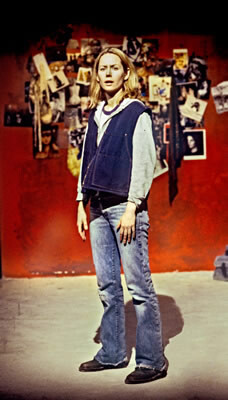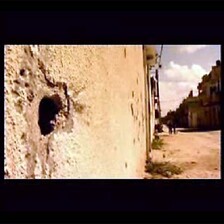The Electronic Intifada 16 April 2007

Megan Dodds in the Royal Court Theatre’s production of My Name is Rachel Corrie (Stephen Cummiskey/Royal Court Theatre)
In New York and Toronto the play was cancelled due to pressure from the Jewish community or those that claim to speak for the Jewish Community. The play was successfully staged in NYC at the Minetta Lane theater. It is currently enjoying an extraordinary run at the Seattle Repertory Theater and many more are planned.
Wherever it has been staged, there has been support from the Jewish community as well as criticism. The Jewish community is not monolithic and no one speaks for “it,” though many claim to.
Much has been written about the play and though theater critics have mostly given glowing reviews, some have been lukewarm, and a scant few have even been negative. That is how theater works.
Unfortunately, the power behind the movement to silence Rachel remains nameless and faceless.
They work in the background by using blackmail and other forms of pressure on theater managers and owners. They do not have to justify their stance and we never get to know who “they” are.
I experienced this silencing first hand while volunteering in Bethlehem as the media coordinator for the International Solidarity Movement immediately after Rachel’s death, and as British activist Tom Hurndall was mortally wounded, and as American activist Brian Avery was seriously injured. I saw that US journalists, under extraordinary pressure, pulled their punches while the British media helped push for the truth.
As a result, the Israeli soldier who shot Tom Hurndall was tried and found guilty of manslaughter. In contrast, there has been no pressure from US media or politicians for a thorough and transparent investigation into Rachel Corrie’s killing, though Israeli Prime Minister Sharon promised one to President Bush.
Censorship however, can create a backlash. A small group of people created Rachel’s Words in response to the popular anger over the New York Theater Workshop’s cancellation of the play last year. We ultimately helped bring Rachel’s message to an even wider audience.
My Name is Rachel Corrie is a play based on the writings of a twenty three year old American woman from Olympia Washington, who was committed to making a difference. Editors Alan Rickman and Katherine Viner culled the best of Rachel’s writings from the time she was very young until her death. Her life ended tragically while trying to protect the home of a Palestinian pharmacist from demolition by a Caterpilar bulldozer driven by an Israeli soldier.
The play is not about the death of Rachel Corrie, it is about her life — her dreams, her beliefs, her desires, her experiences, her faults and all of her humanness.
It was her humanity which prompted her to travel to Gaza and see for herself what was happening.
She quickly learned some ugly truths about another side of humanity, a little more about US foreign policy, and a lot about people’s ability to survive under obscene circumstances.
She noticed that the weapons carried by Israeli soldiers which kill Palestinian children are “made in USA.” So are the bulldozers that illegally destroy Palestinian homes, the helicopter gun ships and the F-16 fighter jets that drop one-ton bombs on apartment buildings full of Palestinian families.
Of this Rachel wrote, “This has to stop. I think it is a good idea for us all to drop everything and devote our lives to making this stop. I don’t think it’s an extremist thing to do anymore. I still really want to dance around to Pat Benatar and have boyfriends and make comics for my coworkers. But I also want this to stop.”
Her writings are based on what she saw. This was her experience and she died for it. The resulting play about her life prompts valuable discussion.
If we had more uncensored discussion on the issue of Israel and Palestine in general, Rachel might be alive today dancing to Pat Benatar.
Rachel represents much of what is best about who we are or like to think we are as Americans.
Those who want to silence her have a right to criticize. They have a right to produce their own play. They even have a right to lie and cheat.
They do not have a right to silence anyone. No one in this country has that right. Some of the gravest errors in US history have resulted from efforts to silence dissenting viewpoints.
By caving to their demands, the Mosaic theater has committed the ultimate crime in the world of theater and arts; that of censorship. They should reconsider their decision lest they lose the right to be called a theater.
Tom Wallace is the editor of
Related Links



